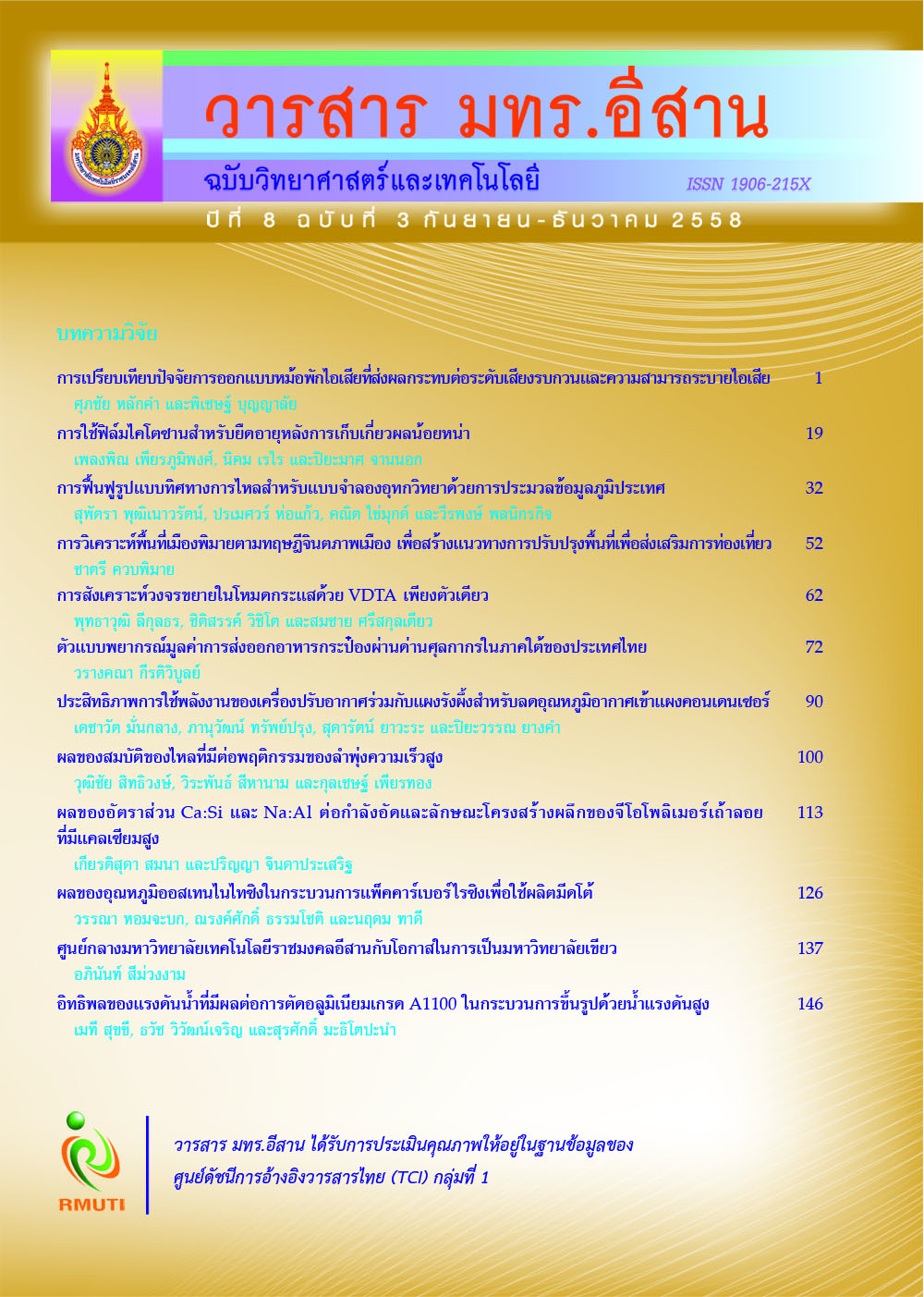ผลของอุณหภูมิออสเทนไนไทซิงในกระบวนการแพ็คคาร์เบอร์ไรซิงเพื่อใช้ผลิตมีดโต้ Effect of Austenitizing Temperature in the Pack Caburizing to Produce Big Knifes
Main Article Content
Abstract
บทคัดย่อ
งานวิจัยนี้มีวัตถุประสงค์เพื่อศึกษาผลของอุณหภูมิการอบเพิ่มคาร์บอนในกระบวนการแพ็กคาร์เบอไรซิง
ของมีดโต้ที่ผ่านการตีขึ้นรูปจากเหล็กกล้าคาร์บอนตํ่า เปรียบเทียบกับมีดโต้ที่ผลิตจากเหล็กแหนบในท้องตลาด
โดยเหล็กกล้าคาร์บอนตํ่าจะนำมาผ่านกรรมวิธีแพ็กคาร์เบอไรซิงที่อุณหภูมิ 900 950 และ 1,000oC
เวลา 1.5 ชั่วโมง แล้วปล่อยให้เย็นตัวในอากาศ จากนั้นนำมาชุบแข็งที่อุณหภูมิ 780oC เวลา 20 นาที
และอบคืนตัวที่อุณหภูมิ 180oC เวลา 1 ชั่วโมง สารแพ็กคาร์เบอไรซิงประกอบด้วยถ่านไม้ผสมกับสารเร่ง
ได้แก่ CaCO3 BaCO3 และ Na2CO3 ผสมเข้าไปร้อยละ 10 โดยนํ้าหนัก จากนั้นทำการทดสอบความแข็ง
แบบไมโครวิกเกอร์ ทดสอบแรงกระแทก และตรวจสอบโครงสร้างจุลภาค จากผลการทดลองพบว่า
ที่อุณหภูมิ 950oC ของสาร BaCO3 และ Na2CO3 เหมาะสมในการผลิตมีดโต้มากที่สุด เพราะมีความแข็ง
ที่ผิวสูงกว่าเหล็กแหนบ และมีความสามารถรับแรงกระแทกได้ดีกว่า สาเหตุที่เป็นเช่นนี้เพราะโครงสร้าง
จุลภาคที่ผิวประกอบไปด้วยโครงสร้างมาเทนไซต์เป็นเนื้อพื้นและเม็ดคาร์ไบด์กระจายตัวอยู่ ส่วนภายใน
โครงสร้างประกอบไปด้วยเพอร์ไลต์และเฟอร์ไรต์
Abstract
The purpose of this research is to study the effect of carburizing temperatures on the
hardness of the hardened big knives in pack carburizing process. The mechanical
properties of the carburized and hardened big knives were compared to those of
commercial hardened big knives made from leaf-spring steel. The experiment was
conducted by forging big knives made of low carbon steel. They were then
pack-carburized using wood charcoal mixing with CaCO3 BaCO3 and Na2CO3 as an
energizer (10% by weight). The carburizing temperatures were 900, 950 and 1,000oC
and carburizing times of 1.5 hours, and then were cooled by air. The austenitizing
temperature was 780oC with a holding time of 20 minutes, followed by quenching
in water. Finally, the big knives were tempered at 180oC for 1 hour. Micro-Vickers
hardness testing, impact testing and microstructure inspection were carried out.
The results of this experiment show that the carburizing temperature of 950oC of BaCO3
and Na2CO3 is suitable for the production of big knifes. It produces the surface
hardness and impact energy higher than leaf spring knifes, because of the microstructure
of the surface consists of martensite matrix with spheroid carbides dispersed, while the
internal structure consists of pearlite and ferrite.
Article Details
References
Lakhtin Y. M. (1990). Engineering physical metallurgy and heat treatment. Mir Publishers
Moscow: Russia
Rajan T. V. (1994). Heat treatment; Principles and Techniques. Prentice-Hall of India
Private Limited: New Delhi
Terasapkul T. and Tantayakorn P. (1998). Experimental report on pack carburizing
compound. Metal-Working and Machinery Industries Development Institute
(MIDI). (In Thai)
Daopisej S., Chaysuwan W. (1998). The carburizingpellet for pack carburizing. The J. of
KMUTNB. (In Thai)
Poltang R. (1998). The comparative experiments of different mixture of pack carburizing
compound in case hardening process. [M Eng thesis]. Kasetsart University. (In Thai)
Thammachot N, Homjabok W. and Thadee N. (2012). The efficiency of different types
of energizers on increasing carbon content on surfaces of low carbon steel in
pack carburizing process. In Proceeding of the national for development on
sustainable research. Srinakharinwirot University. Bangkok. (In Thai)


